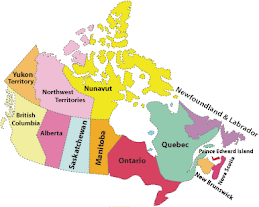Posted by: canadaindians@yahoogroups.com
Thousands of eager immigrants arrive in Canada only to discover their education and professional credentials are almost worthless. The situation is so bad that this week an Edmonton couple decided to sue the federal government. It is a great irony to many in the immigration field, and to newcomers themselves, a bitter joke. Canada has a shortage of skilled professionals, and yet thousands of internationally trained doctors, engineers, teachers and nurses are forced to deliver pizzas and drive taxis. Some immigrants believe that this is intentional, that Canada wants them only for their genetic potential. They may sweep floors and clean offices, but their offspring will be intelligent and creative. Why else would the government accept them and then make it so very difficult to have their credentials recognized? Citizenship and Immigration Canada bristles at such a suggestion, and advises immigrants to check the ministry's Website, which clearly warns newcomers there is no guarantee they will find work in their chosen profession. Still, frustration is mounting: This week, a British-trained accountant and his bookkeeper wife launched a lawsuit against the federal government, alleging that they were misled by immigration officials who assured them they would find good jobs here. Instead, the couple - he is originally from Sri Lanka and she from Malaysia - have spent five years in Edmonton shovelling snow, cleaning toilets and borrowing money to support their teenaged son. "What angers me is we are capable people. We have the credentials. We just can't get the jobs," complained Selladurai Premakumaran, who feels the government has shattered his hopes and dreams. Last year, when Canada changed the way it selects immigrants, many were happy to see the end of the old system, which matched newcomers with worker shortages. Critics had long complained that, by the time the physiotherapists and teachers arrived, those jobs had been filled and the labour shortages were in other fields. Now, Canada chooses immigrants based not on their occupation, but on their education, skills and language abilities. Applicants must score 67 of a possible 100 points to be accepted. Ostensibly, being talented and smart should make them more employable. But it isn't working out that way. Canada is recruiting the right kind of people, but they are stuck in a bottleneck, as the agencies and bodies that regulate the fields of medicine, engineering, teaching and nursing struggle to assess their qualifications. "We have a disaster on our hands," says Joan Atlin, executive director of the Association of International Physicians and Surgeons of Ontario. "There are thousands of un- and under-employed foreign professionals across the country. At the same time, we have a shortage of skilled professionals, especially in the health-care field. We don't so much have a doctor shortage as an assessment and licensing bottleneck."
About 1,300 doctors from more than 80 countries have joined the association she heads, but she estimates there are many more out there. Ontario alone may have as many as 4,000; most of them still trying to get their medical licences. At the same time, there is a shortage of as many as 3,000 physicians across the country, especially in smaller communities in Alberta, British Columbia, Saskatchewan and Ontario (provinces that have been forced to recruit doctors from South Africa, whose medical training Canada considers acceptable). A recent Statistics Canada study of 1,64,200 immigrants who arrived in 2000 and 2001 found that 70 per cent had problems entering the labour force. Six in every 10 were forced to take jobs other than those they were trained to do. The two most common occupational groups for men were science (natural and applied) and management, but most wound up working in sales and service or processing and manufacturing. As well as credentials, there is a problem with supply and demand. Patrick Coady, with the British Columbia Internationally Trained Professionals Network, believes that far too many engineers are coming - as many as 60 per cent of all those accepted each year. (In Ontario, from 1997 to 2001, nearly 40,000 immigrants listed engineering as their occupation.) "When they arrive, the Engineering Council for Canada evaluates their credentials, which sets up the engineer to think there are opportunities here," Mr. Coady says. "Then they discover that each province has a body that regulates the industry. They need up to 18 months of Canadian work experience before they will get professional engineering status. And, there isn't a great need for consulting engineers. A lot of the infrastructure has already been built in this country."
Michael Wu, a geotechnical engineer from China, is a classic example of what's happening. Accepted as a landed immigrant last spring, he came here with his wife and child, leaving behind a relatively prosperous life in Beijing, and now works for $7 an hour in a Vancouver chocolate factory. Back in Beijing, "I had a three - bedroom apartment and took taxis everywhere - the Chinese government sent me to build a stadium in St. Lucia," says Mr. Wu, who has a PhD. "Here, no-one will hire me. Many engineering companies think engineers make false documents. They are suspicious of my qualifications. I never imagined I'd end up working in a factory. But I will keep trying. Every month I go to the Vancouver Geotechnical Society lecture." Susan Scarlett of the Immigration Department points out that regulating the professions is a provincial, not federal, responsibility. "We advise people who are thinking of coming to Canada to prepare by really researching how their credentials will be assessed." Ms. Atlin says that "Canada has been very slow to change. Our regulatory systems have not caught up with our immigration policies." But some relief may be on the horizon because the issue has become such a political flashpoint. A national task force is about to report to the deputy minister of health on the licensing of international medical graduates. And this month Denis Coderre, the federal Immigration Minister, announced that he wants to streamline the process of recognizing foreign credentials, and have provinces announce their inventory of needs so Ottawa can work to fill the shortages. A doctor 'ready to go anywhere, rural Saskatchewan, small-town Ontario...' Tina Ureten, a diminutive, well-dressed physician from Turkey, was always the hardest-working child in a family of hard workers. She knew from an early age what she wanted to be, and left home to study science, math and biology at an elite boarding school in Ankara, the Turkish capital. As a scholarship student, she endured ridicule from her friends when she chose to spend summer after summer honing her language skills at a special English-language camp. She aced her university entrance exams, and was one of 20,000 candidates in a field of 400,000 to be accepted by the nation's medical schools. By 30, she had been appointed associate professor of nuclear medicine, a hi-tech field that uses radioactive materials for diagnosis. Had she stayed in Turkey, she would be at the top of her profession today, a full professor in a department. Instead, she met a Turkish engineer at an international conference, and ended up immigrating with him to Toronto.
Dr. Ureten, now 42, knew it would be difficult to get her medical licence here. But she didn't know it would be such a bureaucratic, disheartening and ultimately fruitless journey. "I sent my application to the Royal College of Physicians and Surgeons 2½ years ago, and I haven't even received a response. I worry my file is lost in a drawer somewhere," she says. "I called my MP and she called the college, and said they were driving her crazy too. "I am ready to go anywhere, rural Saskatchewan, small-town Ontario. The irony is, almost every province has a shortage in nuclear medicine. This country needs my skills." When she came here, Dr. Ureten knew she'd have to write exams and was prepared to retrain. She and her husband sponsored their in-laws to come and look after their two young children so she could spend her days in the library studying. It took her two years to write three of the Medical Council of Canada's evaluation exams, because there is a six-month gap between exams (not the case in the United States). She passed all three tests but wasn't accepted in the medical residency program. More than 150 people applied for one position in nuclear medicine, and the odds are stacked against foreign-trained doctors. (In Ontario, foreign-trained doctors cannot even compete directly for residency positions open to graduating medical students, but are restricted to a few specialties in short supply.) There is a separate stream for foreign-trained doctors, but it has only 125 spaces for graduates in specific fields - and nuclear medicine is not one of them. Dr. Ureten fingers an inch-thick binder, which contains all of her credentials, carefully translated and annotated. There are her fellowships at the University of Wisconsin and in Basel, Switzerland; her training course with the International Atomic Energy Agency, and dozens of peer-reviewed articles published in international science journals. She sent them all off to the Royal College of Physicians and Surgeons in May, 2001. In the past, the college approved the credentials only of doctors who trained in Australia, New Zealand, the United States and England, but two years ago announced a program encouraging all foreign-trained physicians to send in their documents.
Since then, the college has received 600 applications from more than 140 countries, and approved 60 international medical graduates to take Canadian exams in their specialties, says its director of education, Dr.Nadia Mikhael. Dr.Ureten's case is considered "inconclusive," she says. "This case has taken a long time because we are still waiting for Turkey to provide evidence so that we can judge the accreditation system of their postgraduate medical education system. "We don't want to compromise our Canadian standards. And we have to make other specialties a priority, like gynecology, anesthesiology and obstetrics." Joan Atlin, executive director of the Association of International Physicians and Surgeons of Ontario, says it is misleading for the college even to invite international physicians to send in their résumés because it is impossible to assess the programs of hundreds of medical schools around the world. She believes a better solution is to assess people on the job. Ontario recently launched a clearing-house program that would do just this: assess fully trained foreign graduates during six-month rotations in hospitals. "This is the right approach, but it is really just a drop in the bucket." And it won't help Dr. Ureten because nuclear medicine, once again, is not one of the five specialties in the fast-track program. "I feel like they are making it impossible. There are some authorities who just don't want foreign doctors in the system," she complains. "I am ready to go anywhere. There is a need in Canada for people like me, trained, ready to go." Between cramming for medical exams, she found time to train as an ultrasound technician and a medical and cardiac sonographer. Recently, she opened UC Baby in Mississauga, one of the first clinics in Canada to offer pregnant couples a three-dimensional ultrasound and real-time movies of their unborn babies. "I'm proud of my clinic," she says, "but I still feel I'm overqualified for this." She yearns for her true love. "I have met many smart, skilled people from many countries, and you know what? Many are leaving for the U.S., where doctors can more easily be integrated into the system."- Marina Jimenez A need to nurse Milica Cerovsek, 46, was a nurse in a military hospital in Sarajevo for more than 17 years: She tended soldiers in the intensive-care unit, assisted with colonoscopies and tended to all manner of emergencies in the surgical unit. She loved her job so much she sometimes volunteered to work double shifts, forfeiting a night's sleep to nurse patients around the clock, much to her husband's chagrin.
In 1992, conflict in the region spread to open war, people split on ethnic lines, and soon the city was under attack. Although an ethnic Serb, Ms. Cerovsek didn't want to fight; she wanted safety for her two young children. Using her daughter's illness as a pretext, she fled to Belgrade to see a skin specialist, knowing she would never return. Two years later, she arrived in Calgary as a political refugee, and was soon joined by her husband, a professor of aeronautical engineering. As well as their homeland, they had lost their family, culture and status as respected professionals. Ms. Cerovsek agreed to put her career on hold while her husband, reduced to delivering pizzas for $7 an hour, went back to school to retrain as an engineer. In 1997, she finally was able to enter the work force: she qualified as a massage therapist to pay for the long, arduous process of becoming a Canadian nurse. Two years ago, she applied to the Alberta Association of Registered Nurses, gathering together the documents necessary to complete the Assessment of Eligibility for Registration. She had to get in touch with her nursing school in Sarajevo and pay to have transcripts of her marks sent directly to the AARN. The association asked her to take a course in English proficiency, and spend $2,000 on a one-year refresher program in nursing at a community college. She did both, only to be told she lacked credits in obstetrical and psychiatric nursing. "I couldn't believe it. They asked me to go back and do these courses after all my many years of experience," Ms. Cerovsek says. "They said, 'According to your papers, you lack 35 hours of obstetrical nursing training in Sarajevo.' But I had thousands of hours of experience delivering babies, giving injections, assisting doctors in surgery and doing all kinds of nursing." Ms. Cerovsek also planned to pursue geriatric nursing, and had no intention of working in a delivery room, or a psychiatric ward. "I had to spend several thousand more dollars taking these courses. At that point, I really felt like giving up because it seemed so bureaucratic." Donna Hutton, executive director of the AARN, sympathizes but says the association is responsible for maintaining standards and is working "with the government and educational institutes to develop bridging programs for international nurses." The perseverance that saw Ms. Cerovsek through the upheaval of Sarajevo is helping her through her marathon quest to become a nurse in a province that needs them. (Alberta has a shortage and in the next five years see 10 to 20 per cent of its nurses will reach retirement age.) She recently completed the two courses and is ready to begin clinical training and preparing for the national exam. The process has taken four years, and cost about $6,000. "I know so many nurses from Sarajevo who would become nurses tomorrow, but it's too expensive and complicated," she says. "My daughter came home from school and said, 'There is a huge shortage of nurses. Should I study nursing?' "I told her, 'You should only do it if you really love it like I have.' It's been like my third child and I can't wait to get back to it."


